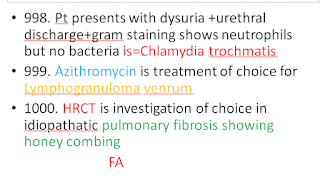Last min Neurology Passmedicine (I)
Neurology 'Fasciculations' - think motor neuron disease Chorea is caused by damage to the basal ganglia, in particular the Caudate nucleus Dystrophia myotonica - DM1 distal weakness initially autosomal dominant diabetes dysarthria Absence seizures - good prognosis: 90-95% become seizure free in adolescence Antiplatelets TIA: clopidogrel ischaemic stroke: clopidogrel Asymmetrical symptoms suggests idiopathic Parkinson's Bitemporal hemianopia lesion of optic chiasm upper quadrant defect > lower quadrant defect = inferior chiasmal compression, commonly a pituitary tumour lower quadrant defect > upper quadrant defect = superior chiasmal compression, commonly a craniopharyngioma Burning thigh pain - ? meralgia paraesthetica - lateral cutaneous nerve of thigh compression CT head showing temporal lobe changes - think herpes simplex encephalitis Cluster headache - acute treatment: subcutaneous sumatriptan + 100% O2 DVLA advice post CVA:...


